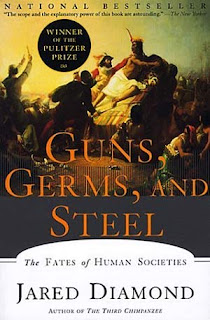Dear reader,
As a student studying holistic marketing I have come across very disturbing industry information. Take the cosmetic industry for example, which is unregulated by the FDA, and the undisclosed toxic chemicals found in everyday perfume that is absorbed by consumer’s skin and eventually the environment, which marketers promote…or the pharmaceutical industry which takes advantage of consumers by influencing the Diagnostic and Statistical Manual (DSM), which essentially allows researchers to create new “illnesses” (please see Shyness: How Normal Behavior Became a Sickness for more information). All though the aforementioned are disturbing, the most disturbing effect of consumption are the millions of animals that suffer at the expense of our choices. In addition, the way we have incorporated animals into our lives in the form of livestock and companionship animals have negative side effects for humans as well - germs. I use Jared Diamond’s incredible book "Germs, Guns, and Steal" and research to discuss how humans arrived at domesticating animals, the lethal gift of animals, and ethical dilemmas we face with domestication today.
Jared Diamond’s quest with this book was to uncover the roots of human inequality throughout the modern world. Diamond perplexes his readers with the question “why did history unfold differently on different continents?” A New Guinean resident, named Yali, originally asked this question to Diamond; “Why is it that you white people developed so much cargo and brought it to New Guinea, but we black people had little cargo of our own” (Diamond). There are comparable differences that separate the lifestyles of peoples from around the world, but why? Diamond believes, through empirical research, that this inequality is due to the natural resources humans had available to them in their geographic locations. "History followed different courses for different peoples because of differences among people's environments, not because of biological differences among peoples themselves" Diamond states dismissing racist explanations. Around the world people were farming but were not propelled down the same path. Diamond says that people who had access to the most productive crops became the most productive farmers and it came down to luck, not innate abilities or inabilities within the people themselves. He believes people around the world are fundamentally similar and development is primarily based on availability and access to raw materials. I am focusing on the side effects of human “progression” in terms of the domestication of animals for it has had various implications despite its many positive attributes to humanity. In Diamond's book, I will primarily be focusing on chapter 11.
Jared Diamond’s quest with this book was to uncover the roots of human inequality throughout the modern world. Diamond perplexes his readers with the question “why did history unfold differently on different continents?” A New Guinean resident, named Yali, originally asked this question to Diamond; “Why is it that you white people developed so much cargo and brought it to New Guinea, but we black people had little cargo of our own” (Diamond). There are comparable differences that separate the lifestyles of peoples from around the world, but why? Diamond believes, through empirical research, that this inequality is due to the natural resources humans had available to them in their geographic locations. "History followed different courses for different peoples because of differences among people's environments, not because of biological differences among peoples themselves" Diamond states dismissing racist explanations. Around the world people were farming but were not propelled down the same path. Diamond says that people who had access to the most productive crops became the most productive farmers and it came down to luck, not innate abilities or inabilities within the people themselves. He believes people around the world are fundamentally similar and development is primarily based on availability and access to raw materials. I am focusing on the side effects of human “progression” in terms of the domestication of animals for it has had various implications despite its many positive attributes to humanity. In Diamond's book, I will primarily be focusing on chapter 11.
